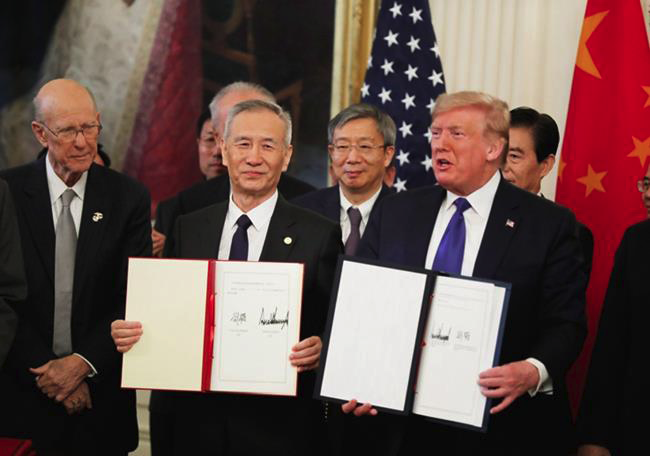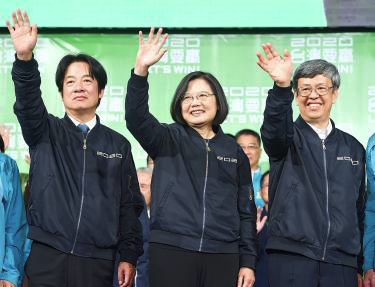Contents
The advent of the Year of Rat wreaked havoc in China, as a "mysterious" pneumonia causing virus, originating in Wuhan, called "Novel Corona Virus,"took the form of an epidemic, threatening lives, disturbing China's social harmony and bringing the world's second largest economy to a virtual standstill. The Wuhan government's mishandling of the outbreak in its early days and withholding of information about the evolving situation, a crackdown on whistleblowers and lack of preparedness to deal with virus brought back memories of the SARS nightmare in China in 2002-2003. As the number of infected people and the subsequent death toll began to skyrocket, an environment of panic and anguish gripped the whole of China, with reports of citizens turning against each other. China's central leadership had to intervene, to bring more transparency and coordinate management of the pandemic.
Beyond the social impact of this highly contagious desease, its economic impact emerged as a major concern for the Chinese leadership. Official data for the month had projected that China's total GDP was about to reach the 100 trillion yuan mark and its per capita threshold had exceeded the US $ 10,000 threshold for the first time in history. However, given the intensity of the epidemic, Chinese economists are estimating that the GDP growth rate may slow down by as much as two percentage points in the first quarter.
China was highly critical of global reactions as it struggled to contain the pandemic. Foreign airlines reducing and cancelling flights to and from China, neighbouring countries closing their borders with China, stereotyping of China and the Chinese people and predictions of an impending collapse of the Chinese economy in social media added to China’s displeasure.
Timely containment of the Novel Corona Virus epidemic has now become the biggest test before the Chinese Communist Party. The Wuhan official’s ”mishandling” of the epidemic in the early days has already dented the party's image, both within and outside China. After China's senior leadership took charge of the situation, efforts are being made to restore public trust and confidence in the CPC. Various high level meetings have been conducted throughout the month, many of them attended by President Xi himself, to take stock of the situation; to form a unified, coordinated command against the epidemic across all levels of Party committees and the government; ensure strict enforcement of orders and prohibitions; and to rule out bureaucratic delays. The CPC would like to fly the party flag high in the frontline of the fight against the disease.
The epidemic has also affected China’s defence industry. Wuhan, which is the epicenter of the deadly virus outbreak, is also home to many Chinese weapons and equipment design and manufacturing institutes, like Wuchang Shipbuilding Industry Group Co Ltd, Naval University of Engineering, etc. These companies have been forced to postpone their scheduled work. Chinese military observers believe that the epidemic will result in substantial delays in the construction of China's new aircraft carrier and fighter jets.
Other than the epidemic, Tsai Ing-wen's re-election as President of Taiwan by a landslide, defeating the populist challenge of her pro-China opponent, came as a blow to China during the month. The re-election was deemed as a "failure" of the Mainland's Taiwan policy.
In the realm of foreign relations, China and the US finally signed the phase-one trade agreement after 22 months of an intense trade war on January 15, 2020. Internally, there has been much disappointment about China’s decision to import US $ 200 billion worth of goods and services from the United States over the next two years as a part of the deal. There still remains "huge uncertainty" about whether the preliminary deal could eventually pave the way for a comprehensive trade deal between China and the US in the future.
Chinese President Xi Jinping paid a two-day state visit (January 17-18, 2020) to Myanmar, the first by a Chinese President in 19 years, providing new impetus and vitality to China-Myanmar bilateral ties.
The month also saw yet another failed attempt by China to raise the Kashmir issue at the UN. This action elicited a strong reaction from India, which urged China to “reflect on the global consensus on Kashmir and avoid raising it at the United Nations.” China and Pakistan also conducted a bilateral maritime exercise ’China-Pakistan Sea Guardians 2020’ in the waters of the northern Arabian Sea, an event closely monitored by India.
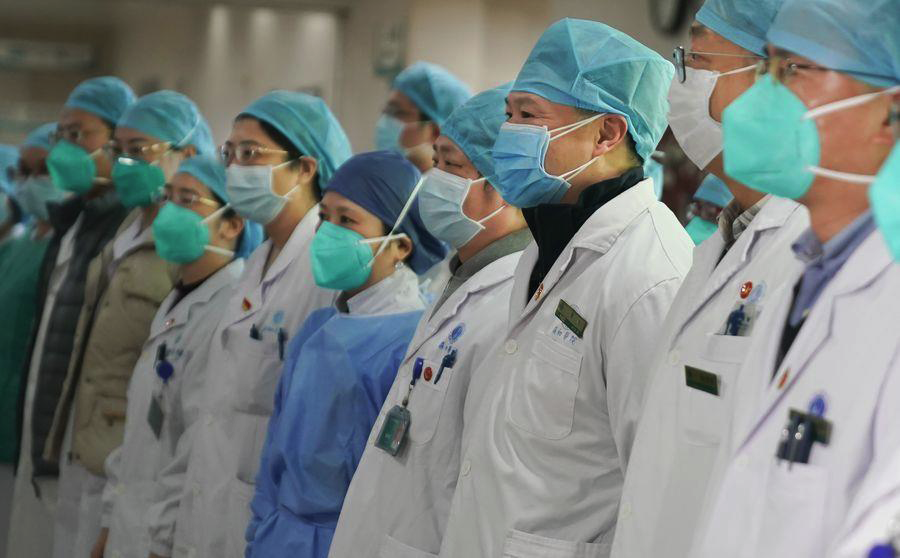
Medical staff in China gears up to form an "assault team" in the fight against the pneumonia caused by the novel coronavirus in Wuhan, January 22, 2019. Source: China Daily,
http://www.chinadaily.com.cn/a/202002/07/WS5e3cde6ba310128217275c79.html
http://www.chinadaily.com.cn/a/202002/07/WS5e3cde6ba310128217275c79.html
The Year of Rat wreaked havoc in China, as a "mysterious" pneumonia causing virus, called "Novel Corona Virus" took the form of an epidemic, threatening lives, disturbing China's social harmony and brought the world's second largest economy to a virtual standstill. The Wuhan government's mishandling of the outbreak in its early days and withdrawal of information about the situation, a crackdown on whistleblowers and lack of preparedness to deal with the virus outbreak brought back memories of the SARS nightmare in China in 2002-2003. Let down by the local government in the face of a serious public health emergency, Wuhan residents who took to social media to vent out their plight, often got booked under the charge of 'spreading rumours'.
By the time Wuhan was formally locked down on January 23 to arrest further spread of the deadly virus, around 5 million people had left the city for the Spring Festival holidaysl. Thereafter, as the number of infected people and the subsequent death toll began to skyrocket by the day, an environment of panic and anguish gripped all of China, in which even citizens turned against each other. There were several reports in the Chinese media about outright discrimination, ostracization, surveillance and leaking of personal information online of people from Wuhan. Given the sharp turn in developments, China’s central leadership had to intervene, ensuring more transparency and coordination in management of the epidemic. Declaring ’People's War' on the pandemic, they strove to mobilise the whole of the Chinese society to take part in a comprehensive prevention and control campaign, to encash China’s precious experience of dealing with the SARS and H5N1 endemic and thereby form a credible line of defence against the present epidemic. China made headlines world-wide by building two hospitals from scatch in two weeks’ time to reduce the burden on the existing public health infrastructure, in the face of rising number of infected patients2.
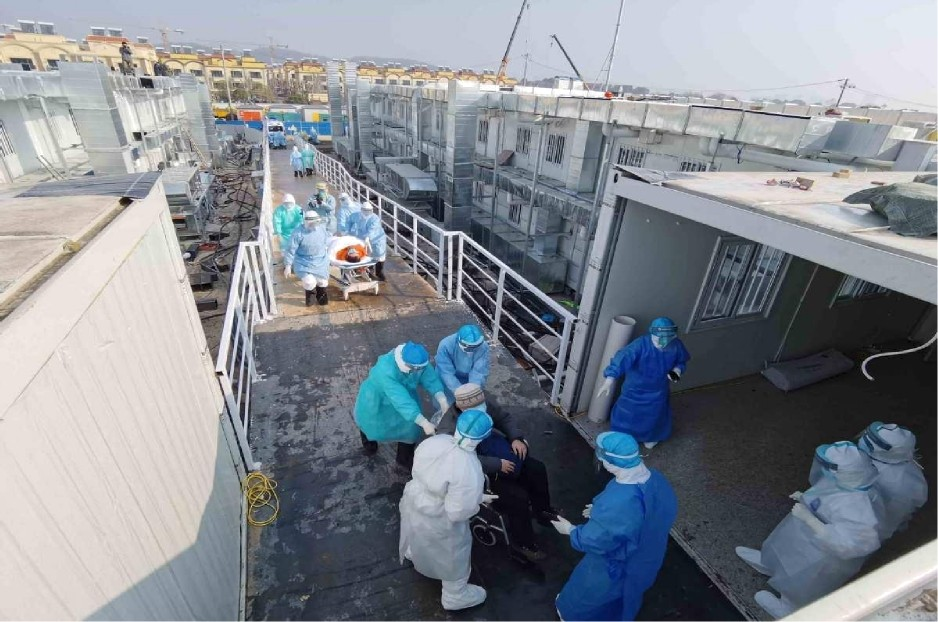
Medical workers transfering patients to the newly built Huoshenshan Hospital in Wuhan, February 4, Source: China Dairy, http://www.chinadaily.com.cn/a/202002/05/WS5e39f85ba310128217274e3c.html
Other than the social impact, it is the economic impact of the epidemic which has emerged as one Of the biggest concerns for the Chinese leadership. Sectors such as tourism, transportation, hospitality and catering have been particularly hard hit, during what would normally have been their peak season. There has been bloodshed3 in the mainland stock markets. Although China's state media continued to project that the blow to the economy is "one off "4 and "limited"; however, pessimism is fast setting in about whether the economy can meet the psychological '6 percent' growth rate target this year. Taking cues from the impact of SARS outbreak on the Chinese economy 17 years ago, even Chinese economists are estimating that the epidemic could rip, no less than two percentage points off the country's GDP growth in the first quarter.
Meanwhile, China has been critical of the global reaction5 that came by, as it struggled to contain the pandemic. Foreign airlines reducing and cancelling flights to and from China, neighbouring countries closing their borders, stereotyping of China and the Chinese people, and predictions of an impending collapse of the Chinese economy on the social media have added to China's displeasure. Chinese media was particularly critical of the US, who according to them, is taking the lead6 in creating global panic by denying entry to people travelling from China, evacuating US nationals before everyone, closing down embassy offices etc., even when the World Health Organisation had appealed to not let the pandemic affect travel and trade. China particularly took offense at US Commerce Secretary Wilbur Ross's recent comment that the epidemic in China has come as a boost to the US economy as it will help to accelerate the return of jobs to North America'.
US president Donald Trump and Chinese Vice premier Liu He, displaying the signed China-U.S. phase-one economic and trade agreement during a ceremony at the White House, January 15, 2020, Source: Xinhua, http://www.xinhuanet.com/english/2020-01/16/c_138709822.htm
The New Year brought reason to cheer as China and the US finally signed the phase one trade agreement on January 15, after 22 months of an intense trade war. China's state media welcomed the development as a "cherished moment," while urging individuals and forces to exercise restraint in their nitpicking of the agreement and bad-mouthing future trade negotiations. They further warned those in China who are preaching for confrontation, while highlighting that it is "mutual compromise" that is the need of the hour.
Chinese media further rationalised China's decision8 to import US $ 200 billion worth in goods and servrices from the United States over the next two years as a part of the deal, on various grounds. First, there was acceptance that China's present surplus with the United States is indeed unsustainable and moving closer to trade balance is a healthier direction for Sino-US economic cooperation. Second, it was argued that just like China's trade surplus acted as a weapon in the hand of the US, China importing more from the US will give it more leverage over US policymaking. Third, the trade deal is believed to further fuse together the economic interests of the two countries, making it difficult to be simply defined9 by the traditional concept of friend and foe.
It was further argued that substantially increasing China's imports of US goods can be a greater challenge to the US than to China because the Chinese government cannot force private companies or Chinese consumers to buy products due to political considerations10.
However, there was "huge uncertainty" within the Chinese strategic community about whether the preliminary deal could eventually pave the way for a comprehensive trade agreement between China and the US. China's state media also did not seem to have convincing answers to other potent questions like, Why didn't China accept all the US conditions from the very beginning, in that case the 22 months of trade war could have been averted? Also, given the slowing economic growth and now the fresh challenges posed by the virus outbreak, how will China find the markets after expanding imports?
Chinese President Xi Jinping went on a two-day visit to Myanmar from January 17-18, 2020. The visit had many firsts to its credit. This was the first visit by a Chinese President to Myanmar in 19 long years. This was President Xi's first visit to the Southeast Asian nation in his current capacity and also his first overseas visit of 2020.
The visit was aimed at providing new impetus and vitality to bilateral ties, speed up the alignment of China's Belt and Road Initiative (BRI) and Myanmar indigenous development strategies under the umbrella of China-Myanmar Economic Corridor11 and thereby, open up a new era for China-Myanmar ties marked by "Paukphaw" (fraternal) friendship.
The visit was aimed at providing new impetus and vitality to bilateral ties, speed up the alignment of China's Belt and Road Initiative (BRI) and Myanmar indigenous development strategies under the umbrella of China-Myanmar Economic Corridor11 and thereby, open up a new era for China-Myanmar ties marked by "Paukphaw" (fraternal) friendship.
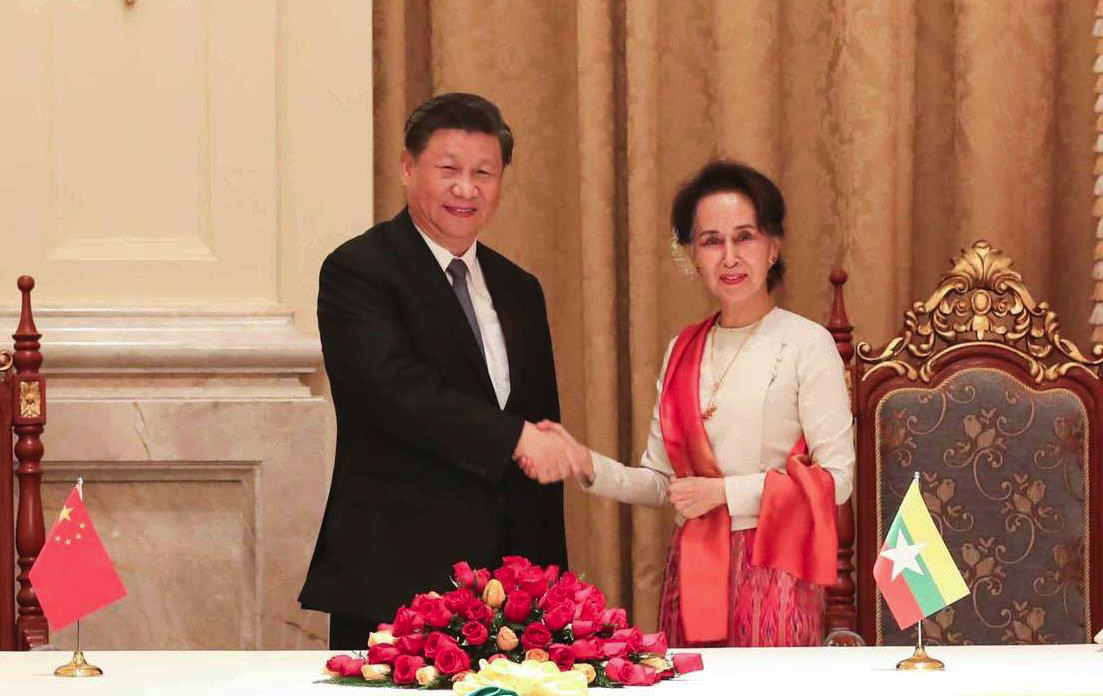
President Xi Jinping with Myanmar State Counsellor Aung San Suu Kyi in Nay Pyi
Taw, Myanmar, January 18, 2020. Source: China Daily,
https://www.chinadaily.com.cn/a/202001/18/WS5e22c702a310128217271e0a.html
Taw, Myanmar, January 18, 2020. Source: China Daily,
https://www.chinadaily.com.cn/a/202001/18/WS5e22c702a310128217271e0a.html
China's state rationalised strengthening of China-Myanmar relations in the evolving international situation. First, the Western countries' vilification Of Myanmar on the Rohingya issue has offended the vast majority Of Myanmar's officials and people. They are deeply disappointed by what they consider the Western nation's almost one-sided support for the Rohingyas, without acknowledging the concerns Of the Burrnese Buddhists. Secondly, investments and tourists from the Western nations did not flow into Myanmar as was expected during the days Of political transformation in 2011. Thirdly, Myanmar embracing ideas and standards Of the Western nations in areas like environmental protection, labour rights etc., had failed to create an ideal enviroment for foreign investments and thereby led to loss of opportunity in economic terms.
In comparison, they argued, China- Myanmar relations have withstood the test of time. China has maintained Myanmar' s status as the country's largest trading er and the most important source of investment for all this while. And, therefore, it seemed like the most opportune time to take the bilateral ties to the next level.
The month saw yet another failed attempt by China to raise the Kashmir issue at the UN. The action eliclted strong reaction from India, which urged China to "reflect on the global consensus on Kashmir and avoid raising it at the United Nations." Meanwhile, alarms were raised in India as China and Pakistan conducted the bilateral maritime exercise13 titled 'China-Pakistan Sea Guardian 2020' from January 10-13, where 11 naval ships from China and Pakistan carried out over 10 drills in the waters of the northern Arabian Sea. The joint exercise promoted the integration of technologies and tactics of the two navies and deepened exchanges and cooperation between the two sides.
The Chinese media also kept a close eye on India's internal developments. A report in the Chinese media highllghted that the Modi government currently faces four major governance problems14 1. The issue Of religion and ethnic harmony. 2. Economic Slowdown 3. Lack Of coordination Of federal-local relations 4. Environmental pollution. As per the Chinese assessment, unless these challenges are successfully mitigated, India will not be able to materialise its 'Major Power' potential. Furthermore, as India displayed its military strength during the 71st Republic Day Celebrations, Chinese strategists questioned India's indigenous Missile Defence capability. They argued that although India has made considerable progress in independent R&D and deployment Of ballistic missile defense system in recent years, it still has a long way to go before it can establish a truly effective ballistic missile defense system and fully exert its real combat force15.
President Tsai Ing- wen secured a second term in office in a landslide victory in the
Presidential Election, January 12, 2020 Source: Taipei Times,
http://www.taipeitimes.com/News/front/archives/2020/01/12/2003729107
Presidential Election, January 12, 2020 Source: Taipei Times,
http://www.taipeitimes.com/News/front/archives/2020/01/12/2003729107
Tsai Ing-wen's re-election as the President of Taiwan by a landslide, defeating her pro-China opponent, came as yet another blow to China. Internally the re-election was deemed as a "failure" of the Mainland's Taiwan policy16
China's state media highlighted that with Tsai back in power, Cross-Strait relations will remain17 in a state of tension and confrontation, with the possibility of further deterioration in the days to come. They predicted three situations from here on. First and most preferred by Beijing, is that the Tsai government accept the "92 Consensus", stop cross-strait confrontation, and gradually abandon "Taiwan independence" separatist activities in order to resume Cross-Strait contacts, dialogue and consultation. Secondly, Cross-Strait relations can reach rock bottom with a radiacl "Taiwan Independence" movement further gaining currency under the present international situation. Third, the running dispensation under Tsai carry on a "progressive Taiwan independence" movement under the guise of the policy of maintaining the status quo. mainlan's reponse will depend on the choice made by the Tsai government.
Further to China's woes, reports in Chinese media highlighted that post defeat18 there were voices within pro-China Kuomintang camp about a possible review of their stance on "1992 Consensus" and "opposition to unification". Some sections Of China's strategic community further argued that Tsai's win can undermine19 the sanctity and global acceptance of China's One China policy. Building up more military pressure on the Tsai authorities, making stronger international promotion Of the one-China principle and exposing "Taiwan separatism and American hooliganism" were highlighted as possible policy-options before Beijing in the present scenario.
4. Defence
President Xi Jinping, on January 29, ordered the Chinese military to make a contribution to winning the battle against the novel coronavirus epidemic. Following his orders, there has been news about Chinese armaments companies postponing planned work in order to concentrate on controlling the spread of the epidemic. Wuhan, which is the epicenter of the deadly virus outbreak, is also home to many Chinese weapons and equipment design and manufacturing institutes, like Wuchang Shipbuilding Industry Group Co Ltd, Naval University of Engineering, etc. Chinese military observers believe that the epidemic will result in substantial delays to the construction of China's new aircraft carrier and fighter jets20.
On the other hand, Chinese strategists belive that 2020 will be a "less peaceful" year in the South China Sea. After strengthening strategic projections and tactical actions in the South China Sea in the past year, US policy measures in the South China Sea are expected to intensify this year, eith claimant countries further taking the opportunity to show strength, warned a report in the Chinese Press. It was further noted that the United States will be playing "new cards" in the South China Sea, including the "gray zone card", "Taiwan / Nansha Taiping Island card", "economic sanctions card", "ecological and environmental protection card", among others21.
5. Economy
Before the Novel Corona virus outbreak took a severe turn, there was much optimism in Chinese strategic circles about the future course of the Chinese economy22 in the Year of Rat'. Data released by China's official bodies highlighted that in 2019, China's total GDP reached23 99.865 trillion yuan, growing 6.1% over the previous year, and the per capita threshold exceeded the US $ 10,000 threshold for the first time, with overall population exceeding 1.4 billion. Despite the downward pressure on the economy, China hoped to "guarantee 6", that is, to rnaintain a 6 percent growth rate and not lose the "fastest growing economy" tag for this year as well. "China is finally moving towards becoming a high-income country" inferred China's state media.
However, some section Of China's strategic community cautioned that even though per capita GDP surpassing 10,000 US dollars is gratifying, however it would not change China's international status as the world's largest developing country. Even though the gap between China 's per capita GDP and high- income countries is narrowing, but it is still substantial. Therefore, China will "not be proud and complacent, and should continue to use reform and opening up as the driving force to promote high-quality development"
Beginning Of the month the key message emanating from the Party's top leadership was that China is gearing up to achieve its flrst centenary goal Of becoming a moderately well off society by 2020. Both in the New Year Speech and the Spring Festival speech on January 23, President Xi indicated that the millennia-old dream of the Chinese nation to win the battle against absolute poverty and become a moderately prosperous society will become reality this year25.
However, with Novel Corona Virus taking center stage, timely containment Of the epidemic has now become the priorlty before the Chinese Communlst Party. The Wuhan official's mismanagement Of the epidemic in the early days has already dented the party image both within and outside China. Therefore, after the senior leadership took charge Of the situation, efforts are being made to restore public trust and confidence in the party. Various high level have been conducted throughout the month, many Of them attended by President Xi himself, to take stock Of the situation, to form a unified, coordinated command against the epidemic across all levels Of Party committees and the government, to ensure a strict enforcement of orders and prohibitions, and to rule out any form of bureaucratic delay. The idea is to fly the party flag?! high in the frontline of the fight against the epidemic. China's played by the primary- state media has been particularly highlighting the level organisations of the Communist Party of China (CPC), who have quickly joined the battle by creating awareness and tracking down and putting infectious patients under strict quarantine, thereby preventing further spread of the virus and maintaining "order" within in the society.
1'500万人离开武汉,当务之急和要避免的, Huanqiushibao, January 27, 2020, https://opinion.huanqiu.com/article/9CaKrnKp4Yk
2 ‘2 in 2 weeks - - Hospital building speed matters in China's virus battle', Xinhua, February 6, 2020, http://www.xinhuanet.com/english/2020-02/06/c_138761691.htm
3'Contaiming epidemic key to rebound', Global Times, February 3, 2020, https://www.globaltimes.cn/content/1178380.shtml
4 'Coronavirus blow to economy is one-off and for a limited time: China Daily editorial', China Daily, February 3, 2020, https://www.chinadaily.com.cn/a/202002/03/WS5e3813bfa310128217274859.html
5'做好自己,无需担心世界歧视中国', Huanqiushibao, January 31, 2020, https://opinion.huanqiu.com/article/9CaKrnKp8ms
6'Bad demonstration effect of US moves: China Daily editorial', China Daily, February 2, 2020, https://www.chinadaily.com.cn/a/202002/03/WS5e38144fa31012821727485e.html
7'US talk of taking advantage of misfortune unpalatable: Editorial', China Daily, January 31, 2020, https://www.chinadaily.com.cn/a/202001/31/WS5e341333a310128217273e50.html
8'如何看中国大规模增加从美进口' Huanqiushibao, January 16, 2020, https://opinion.huanqiu.com/article/9CaKrnKoVn2
9'下滑的中美关系迎来首个关键协议' Huanqiushibao, January 14, 2019, https://opinion.huanqiu.com/article/9CaKrnKoRTf
10' 'US faces pressure to increase exports', Global Times, January 16, 2020, https://www.globaltimes.cn/content/1177128.shtml
11'习近平访问,开辟中缅关系新篇章, Huanqiushibao, January 21, 2020, https://opinion.huanqiu.com/article/9CaKrnKoVzY
12'深化互利合作,推动中缅关系迈入新时代',Huanqiushibao, January 17, 2020, https://opinion.huanqiu.com/article/9CaKrnKoWa2
13'China-Pakistan Sea Guardians 2020 joint exercise concludes fleet drills', Global Times, January 15, 2020, https://www.globaltimes.cn/content/1176904.shtml
14'莫迪政府面临四大治理难题', Huanqiushibao, January 6, 2020, https://opinion.huanqiu.com/article/9CaKrnKoIOU
15'India's indigenous missile defense capability is nowhere near strong', http://eng.chinamil.com.cn/view/2020-01/21/content_9722842.htm
16'实事求是看台海局势的总态势', Huanqiushibao, January 13, 2020, https://opinion.huanqiu.com/article/9CaKrnKoRAm
17'这是 台独 分子心中永远的痛', Huanqiushibao, January 14, 2020, https://opinion.huanqiu.com/article/9CaKrnKoRUo
18'国民党 青壮派 搞错检讨方向', Huanqiushibao, January 22, 2020, https://opinion.huanqiu.com/article/9CaKrnKp1an
19'维护一中国际框架,中国完全做得到', Huanqiushibao, January 22, 2020, https://opinion.huanqiu.com/article/9CaKrnKoQxV
20'Safetu prioritized for aircraft carrier, fighter jet developers amid virus outbreak', Global Times, February 3, 2020, https://www.globaltimes.cn/content/1178366.shtml
21'美酝酿在南海打新牌,中方宜早做准备', Huanqiushibao, January 21, 2020, https://opinion.huanqiu.com/article/9CaKrnKp034
22'鼠年中国经济有哪些点值得期待 ', Huanqiushibao, January 22, 2020, https://opinion.huanqiu.com/article/9CaKrnKp1as
23'中国破两大门槛,成绩挑战一币两面', Huanqiushibao, January 17, 2020, https://opinion.huanqiu.com/article/9CaKrnKoWsI
24'我人均 破万 世界 万元户 翻番', Huanqiushibao, January 21, 2020, http://views.ce.cn/view/ent/202001/21/t20200121_34166613.shtml
25'奋斗创造历史,实干成就未来, Huanqiushibao, January 22, 2020, https://opinion.huanqiu.com/article/9CaKrnKp2UY
26'Xi chairs leadership meeting on epidemic control',Global Times, February 4, 2020, https://www.globaltimes.cn/content/1178396.shtml
27'@共产党员,关键时刻看担当', Huanqiushibao, february 1, 2020, https://opinion.huanqiu.com/article/9CaKrnKp8sa
28'Response to virus shows strength of Party system', Global Times, february 3, 2020, https://www.globaltimes.cn/content/1178375.shtml
6'Bad demonstration effect of US moves: China Daily editorial', China Daily, February 2, 2020, https://www.chinadaily.com.cn/a/202002/03/WS5e38144fa31012821727485e.html
7'US talk of taking advantage of misfortune unpalatable: Editorial', China Daily, January 31, 2020, https://www.chinadaily.com.cn/a/202001/31/WS5e341333a310128217273e50.html
8'如何看中国大规模增加从美进口' Huanqiushibao, January 16, 2020, https://opinion.huanqiu.com/article/9CaKrnKoVn2
9'下滑的中美关系迎来首个关键协议' Huanqiushibao, January 14, 2019, https://opinion.huanqiu.com/article/9CaKrnKoRTf
10' 'US faces pressure to increase exports', Global Times, January 16, 2020, https://www.globaltimes.cn/content/1177128.shtml
11'习近平访问,开辟中缅关系新篇章, Huanqiushibao, January 21, 2020, https://opinion.huanqiu.com/article/9CaKrnKoVzY
12'深化互利合作,推动中缅关系迈入新时代',Huanqiushibao, January 17, 2020, https://opinion.huanqiu.com/article/9CaKrnKoWa2
13'China-Pakistan Sea Guardians 2020 joint exercise concludes fleet drills', Global Times, January 15, 2020, https://www.globaltimes.cn/content/1176904.shtml
14'莫迪政府面临四大治理难题', Huanqiushibao, January 6, 2020, https://opinion.huanqiu.com/article/9CaKrnKoIOU
15'India's indigenous missile defense capability is nowhere near strong', http://eng.chinamil.com.cn/view/2020-01/21/content_9722842.htm
16'实事求是看台海局势的总态势', Huanqiushibao, January 13, 2020, https://opinion.huanqiu.com/article/9CaKrnKoRAm
17'这是 台独 分子心中永远的痛', Huanqiushibao, January 14, 2020, https://opinion.huanqiu.com/article/9CaKrnKoRUo
18'国民党 青壮派 搞错检讨方向', Huanqiushibao, January 22, 2020, https://opinion.huanqiu.com/article/9CaKrnKp1an
19'维护一中国际框架,中国完全做得到', Huanqiushibao, January 22, 2020, https://opinion.huanqiu.com/article/9CaKrnKoQxV
20'Safetu prioritized for aircraft carrier, fighter jet developers amid virus outbreak', Global Times, February 3, 2020, https://www.globaltimes.cn/content/1178366.shtml
21'美酝酿在南海打新牌,中方宜早做准备', Huanqiushibao, January 21, 2020, https://opinion.huanqiu.com/article/9CaKrnKp034
22'鼠年中国经济有哪些点值得期待 ', Huanqiushibao, January 22, 2020, https://opinion.huanqiu.com/article/9CaKrnKp1as
23'中国破两大门槛,成绩挑战一币两面', Huanqiushibao, January 17, 2020, https://opinion.huanqiu.com/article/9CaKrnKoWsI
24'我人均 破万 世界 万元户 翻番', Huanqiushibao, January 21, 2020, http://views.ce.cn/view/ent/202001/21/t20200121_34166613.shtml
25'奋斗创造历史,实干成就未来, Huanqiushibao, January 22, 2020, https://opinion.huanqiu.com/article/9CaKrnKp2UY
26'Xi chairs leadership meeting on epidemic control',Global Times, February 4, 2020, https://www.globaltimes.cn/content/1178396.shtml
27'@共产党员,关键时刻看担当', Huanqiushibao, february 1, 2020, https://opinion.huanqiu.com/article/9CaKrnKp8sa
28'Response to virus shows strength of Party system', Global Times, february 3, 2020, https://www.globaltimes.cn/content/1178375.shtml



